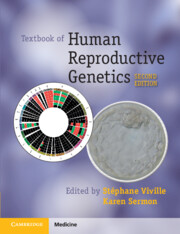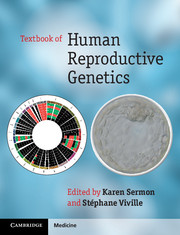15 results
Contents
-
- Book:
- Textbook of Human Reproductive Genetics
- Published online:
- 15 December 2022
- Print publication:
- 05 January 2023, pp v-vi
-
- Chapter
- Export citation
Index
-
- Book:
- Textbook of Human Reproductive Genetics
- Published online:
- 15 December 2022
- Print publication:
- 05 January 2023, pp 237-246
-
- Chapter
- Export citation
Chapter 8 - Genetics of Human Male Infertility: The Quest for Diagnosis and Treatment
-
-
- Book:
- Textbook of Human Reproductive Genetics
- Published online:
- 15 December 2022
- Print publication:
- 05 January 2023, pp 116-131
-
- Chapter
- Export citation
Contributors
-
- Book:
- Textbook of Human Reproductive Genetics
- Published online:
- 15 December 2022
- Print publication:
- 05 January 2023, pp vii-viii
-
- Chapter
- Export citation
Copyright page
-
- Book:
- Textbook of Human Reproductive Genetics
- Published online:
- 15 December 2022
- Print publication:
- 05 January 2023, pp iv-iv
-
- Chapter
- Export citation

Textbook of Human Reproductive Genetics
-
- Published online:
- 15 December 2022
- Print publication:
- 05 January 2023
Contributors
-
-
- Book:
- Textbook of Human Reproductive Genetics
- Published online:
- 05 April 2014
- Print publication:
- 10 April 2014, pp vii-viii
-
- Chapter
- Export citation
Index
-
- Book:
- Textbook of Human Reproductive Genetics
- Published online:
- 05 April 2014
- Print publication:
- 10 April 2014, pp 199-206
-
- Chapter
- Export citation
Textbook of Human Reproductive Genetics - Half title page
-
- Book:
- Textbook of Human Reproductive Genetics
- Published online:
- 05 April 2014
- Print publication:
- 10 April 2014, pp ii-ii
-
- Chapter
- Export citation
Textbook of Human Reproductive Genetics - Title page
-
-
- Book:
- Textbook of Human Reproductive Genetics
- Published online:
- 05 April 2014
- Print publication:
- 10 April 2014, pp iii-iii
-
- Chapter
- Export citation
Copyright page
-
- Book:
- Textbook of Human Reproductive Genetics
- Published online:
- 05 April 2014
- Print publication:
- 10 April 2014, pp iv-iv
-
- Chapter
- Export citation
Preface
-
- Book:
- Textbook of Human Reproductive Genetics
- Published online:
- 05 April 2014
- Print publication:
- 10 April 2014, pp ix-x
-
- Chapter
- Export citation
8 - Genes and infertility
-
-
- Book:
- Textbook of Human Reproductive Genetics
- Published online:
- 05 April 2014
- Print publication:
- 10 April 2014, pp 113-126
-
- Chapter
- Export citation
Contents
-
- Book:
- Textbook of Human Reproductive Genetics
- Published online:
- 05 April 2014
- Print publication:
- 10 April 2014, pp v-vi
-
- Chapter
- Export citation

Textbook of Human Reproductive Genetics
-
- Published online:
- 05 April 2014
- Print publication:
- 10 April 2014



